#the chartists
Text
I listened to In Our Time on the Chartists. I thought of them as an early suffrage movement and didn't know they were so ambivalent and (possibly unintentionally) damaging to women's causes. Good listen.
0 notes
Text

DJ Prime Cuts - Rave Master
7 notes
·
View notes
Text
It says a lot about charles smith that even though it’s been four years since his debut with literally no new canon content in that time there’s still new fan content about him p much daily
#not even just in the context of charthur ive seen a lot of brand new charles fanart in january. chartists (get it) are doing god’s work#i may have been four years late to this party but by golly i am still being fed#charles smith#rdr2#same could be said about other gang members too obvs but this ain’t about them
13 notes
·
View notes
Text
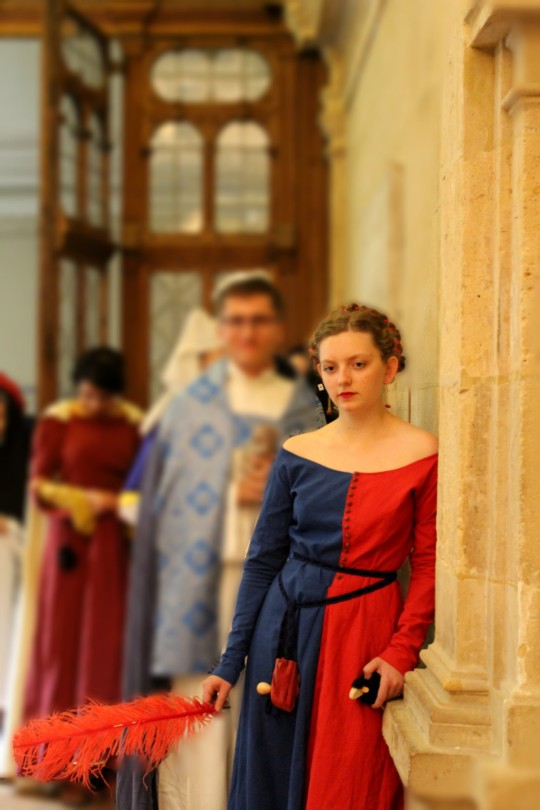
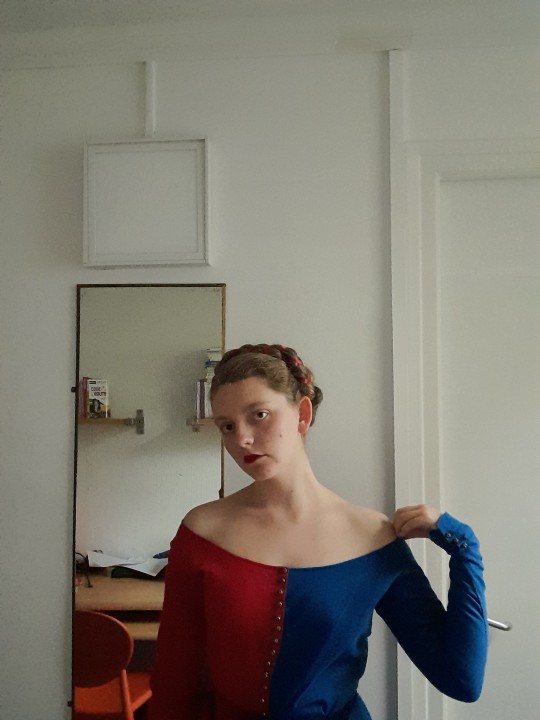
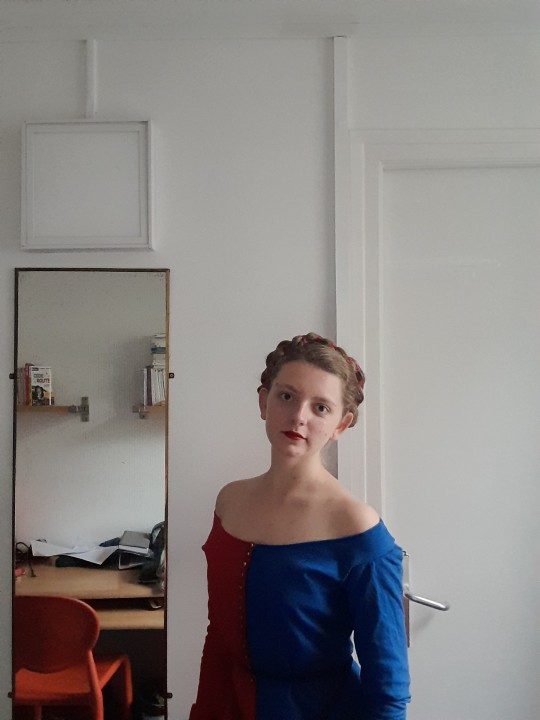
Ma cotehardie fin XIVe en action... Au sacre royal chartistique d'hier, ou plutôt de 1382.
#cotehardie#Chartiste#classic academia#old soul#historical fashion#Cotehardie#14th century#XIVe siècle#medieval sewing#sewing#Reconstitution#Chartes#Sacre#Sacre chartistique#1382#Archiviste#Grande archiviste#Paris#St-Etienne du Mont#École des Chartes#Prépa Chartes
10 notes
·
View notes
Text
No widely popular songs hymned companionate and egalitarian marriages, but the radical Samuel Bamford wrote tender love poems to his wife and children.
How happy may we be, my love!
How happy may we be,
If we our humble means improve,
My wife, my child, and me.
Our home shall be a turtle's nest,
Where duty, peace, and love,
Shall make its inmates truly blest,
And sorrow far remove.
And if the world upon us frown,
Still peace serene is ours;
It cannot bear the free mind down,
With all its tyrant powers:
For if they bear me far away,
And bind me with a chain,
Our nestling will beside thee stay –
Then do not, love, complain.
As an active Chartist, handloom weaver and protester at the Peterloo demonstration, Bamford made it clear that the happy marriage depended upon the couple improving their 'humble means' and braving tyranny.
"Normal Women: 900 Years of Making History" - Philippa Gregory
#book quotes#normal women#philippa gregory#nonfiction#companionate#egalitarian#marriage#samuel bamford#love poem#poetry#happiness#duty#peace#love#serenity#chartism#chartist#handloom weaver#protestor#peterloo demonstration#happy marriage#improvement#humble means#tyranny
0 notes
Text
Another woman radical, Elizabeth Pease, risked her status by supporting Chartism and said it was an 'almost outrageous stance for a lady'.
"Normal Women: 900 Years of Making History" - Philippa Gregory
#book quote#normal women#philippa gregory#nonfiction#radical#chartism#chartist#elizabeth pease#outrageous
0 notes
Text
i agree with fukuyama actually. history is over, let's call it a day and write no more on the subject.
#'miller argues that radical patriotism ended with the chartists'#'andrews dates it to the boer war'#'i argue it ended in 1914'#how about we all agree to disagree and never think about this again
0 notes
Text
at this point i’m liking every person who doesn’t post a sappy memorial post on instagram (facebook may as well not exist at this point but i’m sure it’s worse)
0 notes
Text
ok i voted don't ask me who for
0 notes
Text
one of the things i find most interesting about the protests in france at the moment is this idea that the british would supposedly never do such a thing, because it makes me think about how different this country might be if we taught history properly.
by which i mean instead of just teaching kids about kings and queens and world war two, we taught them about chartists and suffragettes (and not just the polite, middle-class suffragettes), the peterloo massacre, the poll tax riots, the peasants' revolt, the general strikes of 1842 and 1926, the bristol bus boycott, the brixton uprising... i could go on but you get the picture.
596 notes
·
View notes
Text
Welsh should stand up to attack on culture - Sheen
Actor Michael Sheen says the Welsh public must rise up and defend its cultural institutions to prevent an "unthinkable" end to the Welsh arts sector.
He listed funding cuts at Welsh National Opera, National Theatre Wales and Museum Wales as examples of "an attack on culture" in Wales.
His comments came ahead of the Welsh debut of the play Nye, in which Sheen portrays Welsh politician Aneurin Bevan, the architect of the NHS.
The Welsh government said it has had to take “extremely difficult decisions” to focus funding on core public services, including the NHS.
Sheen, from Port Talbot, said it would "an outrage... terrible" if a continuation of funding cuts meant an end for the Welsh arts sector and insisted the public would not let that happen.
“We are not going to let our country die, are we. We are not going to let it culturally die and wither on the vine," he said.
"We have to do something about it. We’re not going to sit here and let people take everything away from us.”
On taking on the role of Aneurin - or Nye - Bevan, Sheen said he felt an "emotional and passionate connection" to the Tredegar politician, but said it was also "a lot to live up to".
The play was written by Welsh playwright Time Price and is a co-production between Wales Millennium Theatre and the National Theatre in London, where it premiered in April - it will play in Cardiff from 18 May to 1 June.
It tells the story of Nye in a series of flashbacks as a morphine-induced Bevan lies in a hospital bed battling terminal stomach cancer in 1960.
Sheen said it is now time for Wales to tell its own stories - despite the squeeze on public funding.
"Walking in here yesterday, walking onto the stage I got a real excitement about the potential for this space, for plays telling Welsh stories, the story of Wales," he said.
"No one else is doing it. Where is the great play about the Chartists, the Miner’s Strike, our cultural life and history?
"We have to make sure our voices are heard. Even if the opportunities for those voices to be heard are being shut down, then we have to shout louder don't we."
The Welsh government said: “Wales’ culture, art and sports institutions are an integral part of our society and well-being, enriching our communities and inspiring future generations.
"We have acted to mitigate the full scale of the budget pressures on these sectors.
"However, we have been clear our budget is up to £700m less in real terms than when it was set in 2021.
"We have had to take extremely difficult decisions to focus funding on core public services, including the NHS.
"Based on [the UK government's] plans our budget will be lower per person in real terms in 2028/29 than it was in 2022/23.”

49 notes
·
View notes
Text
Serendipity & Chance

Warnings: none.
----------------------------------------------------------
Chapter 2 - the city
Anjali glanced out the window of their carriage, taking in the sights of the city around them.
“Ahh! I love the city!” she declared. “If only we could stay here all year round!” She gave a wistful sigh and X frowned, displeased with the thought.
“I think half the year is just enough for me,” she argued. “There wouldn’t be enough space for Asha.” She slumped back in her seat, exhausted by the pong journey they'd taken to get there - and also by the prospect of having to deal with all the gossip that came with London high society.
“Oh, you and your horses!” Anjali chastised her, waving her sister's complaints away. “It is rather unbecoming of a lady to enjoy riding as much as you do, Penji.”
X bit her tongue, swallowing down the first response that came to mind: what did it matter how ‘unbecoming’ she appeared to society when she’d already been promised a suitor for the Season? But she couldn’t reveal to her sister and mother the deal she’d made with their neighbour the day before. Her stomach twisted at the thought of all the engagements they’d have to attend together, all the intimate moments they’d need to fake in order to convince everyone else that they truly were in love with one another. And oh, Gabriel: what would he think of her through it all? The carriage slowed to a stop and their footman quickly appeared to help the three ladies down from their carriage.
“Gwen!” Anjali squealed, delighted to see her friend waiting for them by the door. She rushed forward to give her a hug and Gwen returned with the same uncontainable enthusiasm.
“Ahh! It is so good to see you, Anjali! And you, X!” She moved to give the older girl a hug, then curtsied before their mother in greeting. “I cannot believe that six months have gone by since we last saw one another!” Gwen’s father was the Commissioner of Police of the Metropolis and as a result, her family had always stayed in the city all year round. Her mother had passed from illness when she’d been quite young, however, so she always got a little lonely whenever her friends retired to the country seats for the winter months.
“Nor I, my friend,” X agreed, making her way over to their house. “How have you been? How is your father?”
“Oh, we have been quite all right. Just …” Gwen stopped suddenly and gestured for the two sisters to lean in a little closer to her, a conspiratorial look on her face as she studied their surroundings for any eavesdroppers. “Apparently, there is a group of radicals who have been expressing their discontent with the current system of rule. They call themselves the ‘chartists’ and have been campaigning for the reformation of the voting system!”
The girls gasped and Anjali grabbed Gwen's forearm, horrified. “My goodness! Whatever do they hope to achieve?!”
Gwen pursed her lips in thoughts, starting to get a little unsure of herself. “I am not entirely certain. My father refused to share any further details with me, so I am afraid that that is all I know of it.”
X placed a hand on Gwen’s other arm and gave her an approving nod. “Good. It wouldn’t do to get yourself mixed up with such … such fanatics!”
“Mmm. Yes, well, enough of me! How was your trip?!” She turned to face X, clasping her hands and beaming from ear to ear. “Are you excited for your first Season, X?!”
X's smile slipped slightly at the reminder of the charade she would have to put on for the next six months. For Gabe, she reminded herself, so Miguel could get the money to pay off his father’s debts, allowing them to live happily ever after. She took a deep breath and forced her lips to stretch a little wider. “Oh, definitely! I am .. ecstatic! Just imagine all the dancing and the dresses and the festivities …”
“And the men,” Anjali added, nudging her arm playfully.”
“Anjali!” X gasped, her shocked expression causing her sister and their friend to burst into laughter.
“Sorry, Penji, but I just had to tease you,” Anjali apologised. “That is what your Season is for, is it not? To meet your perfect Prince Charming and have him sweep you off your feet for your happily ever after?”
“Right,” X agreed, forcing another awkward smile onto her face. “Happily ever after.” But her happily ever after would just have to wait until next Season.
Gabe sucked in a breath when he stepped out of the carriage, grinning excitedly at his surroundings.
“Oh how I do love the city!” he declared to the world around him. He turned around and rushed back to the carriage to help his mother down from it. “Careful, mama!”
“Thank you, Gabriel,” his mother said, taking his hand and lowering herself gracefully. “I shall go check on our house. Perhaps the two of you can take a tour about the area? See the sights, get to know any new neighbours.” She shot a pointed look at Miguel and he shifted uncomfortably in position, understanding exactly what she was trying to say.
“Already?!” Gabe lamented, oblivious to the silent conversation taking place before him. “But we just got here, mama! Surely that can wait until tomorrow?”
Miguel held his mother’s gaze, silently beseeching the same - it had been a long journey and surely anyone arriving that day would have been as exhausted as they were. His mother stood her ground, unrelenting in her decision, but then Gabe perked up, waving delightedly at someone across the street. Miguel looked up and relaxed slightly when he saw their neighbour standing there in her dark blue dress, grinning brightly at his brother. Her gaze turned to him and his lips instinctively curled into that teasing smirk he only ever reserved for her. She frowned, her rosy mouth twisting into a pout as she gave him a curt nod, and Miguel found his smile stretching even wider at the sight of her irritation. He turned around when he heard his mother let out a huff and wasn’t surprised to find her disappearing into their house. She’d always do her best to not let it show in public, but Miguel knew that his mother cared not for their immigrant neighbours. Aside from fearing that their association might remind society of her own foreign background that she’d passed onto both of her sons, she knew how well-informed X was of all the goings-on that occurred in her household - there was no love lost between the two of them. Miguel sighed and followed his mother indoors, his lips twitching at the thought of the fit she’d have when she found out who he intended to pursue that Season.
She twisted her body this way and that, trying to get a full view of the dress she’d put on.
“Absolutely gorgeous, my darling!” the seamstress cried, bustling around her in excitement. “I guarantee you shall have at least three proposals by the end of the night!”
X pursed her lips, unsure about the bold claim. “I am … not sure …” It was the third shop they’d been to and the fifth dress she’d tried on that day. And yet, she still couldn’t find what she was looking for! The bodice felt too tight, constricting her ribs and pushing her breasts almost all the way up to her chin. And the skirt wasn’t flowing the way she wanted it too - it was too stiff, dragged down by the layers of support needed to shape the flimsy material. She’d look so awkward whilst moving around, her foreign heritage accentuated by how unsuited her body was to the upper class London style of dress. She sighed and stepped off the platform, disappointed. “No, I … I am sorry, Mrs Thatcher, but … this just won’t do for me. Perhaps I shall come again tomorrow and we can try a different style.”
She headed for the dressing rooms and the older lady scurried after her to help her get her dress off. Gwen turned to Anjali, confused and exhausted. “That is the fifth dress she’s tried on today!”
“I know!” Anjali agreed, equally as fed up with her sister’s irritable state. “But … I am not sure it’s the dress that’s bothering her.”
Gwen raised an eyebrow, not understanding.
“Let me go talk to her,” Anjali decided, making her way over to the changing rooms. She reached just as her sister was stepping out from behind the curtain and stopped her in her tracks. “Penji? What is the matter?”
“Nothing, I … I just can’t see myself greeting the Queen in any of these dresses,” she admitted, not entirely lying to her sister. She straightened her features, wiping the nervous look of her face, then marched back towards the entrance.
“It’s all right to be nervous, Penji!” Anjali assured her, picking up her pace to match her sister’s. “It is your first time, after all, but so it will be for every woman who will be there as well!”
X stopped in front of the carriage and clenched and unclenched her fists, trying to get rid of her nerves. “Yes, but … not every woman is a foreigner who has to prove that she deserves an equal chance to the people who stole her country.”
But aside from having to represent her entire culture to the ruler of the British empire, she had to put on a good act for Miguel as well - who would believe that the newly legitimised son of an Earl would be interested in courting her otherwise? Anjali curled her fingers around her sister’s wrist and gave her a reassuring squeeze.
“Well then,” Anjali began, her features taking on a mischievous expression as she held her head high, “we shall just have to conquer them right back. Yes?”
X relaxed at her sister’s words and flashed her a sheepish smile. “You’re right. Perhaps we should try one last shop?”
Gwen glanced around at their surroundings, her nose wrinkling at the unsanitary smell that permeated the quickly deteriorating alleyways. They’d had to leave their carriage behind as the roads had become narrower, choosing to continue their journey on foot instead. But that only left them all the more vulnerable to the curious - and uncomfortably hungry - gazes that lingered a little too long on their painstakingly stitched garments. Gwen shuffled closer to Anjali and grabbed her by the elbow. “Are you sure this area is … safe?”
Anjali gave her friend a reassuring pat on the arm. “It is quite all right, Gwen: we’ve been here before. We have a family friend who own a tailoring shop around here. We should be there soon.”
X stopped in front of a cosy-looking shop, then pulled the door open and stepped inside.
“Masi (Aunty)!” she exclaimed, drawing the attention of the plump woman standing at the back of the shop. She turned around, bewildered, then her expression lit up when she saw who it was.
“Lady X!” She rushed over to the door and scooped her up in a warm hug, then turned to Anjali to do the same. “Lady Anjali! It has been too long since I have seen you, my darlings!”
“Please, Masi, dispense with the formalities,” X requested. “We are all family here.” The woman swivelled back around to X and gave her cheeks an affectionate squeeze.
“Oh, how you’ve grown, beti (child)! Not a single man will be able to resist your charms! May God keep you safe.” She dabbed at her eye, smearing some of her kohl onto the pad of her finger, then she pressed it to the back of X’s ear. She stepped back, satisfied, and her gaze fell upon Gwen. “Who is this young lady?”
“This is our friend, Gwen!” Anjali introduced her to the tailor. “Gwen, this is Mrs Talwar, the finest tailor in all of London!”
“Chup karja! Amey nazar laagna. (Keep quiet! I’m anyhow going to get jinxed.)” Laila chastised her. “Now, how can I help you today?”
“I need a dress for the Queen Charlotte’s ball,” X replied, her expression turning anxious as she considered the possibility of once again not finding her perfect dress. Laila covered her mouth with her hand, shocked by the unexpected news.
“Already?” she questioned. “My goodness, you really have grown, beti! Come, come, I have just the thing!” She ushered X towards the changing rooms and Gwen took the opportunity to lean closer to Anjali.
“Er, Anjali. Do you happen to know if there is a place nearby where I might … relieve myself?” she inquired softly. “I am afraid I was not prepared for how long our trip would end up being.”
“Certainly! It is just around the corner. Turn left when you walk out of the shop and you should see it right away.” Gwen nodded and scurried out of the shop to find the toilet. She turned the corner - just as Anjali had instructed - but couldn’t seem to find any semblance of a toilet anywhere. She walked a little further down the street, wondering if perhaps her friend had understated the distance to the lavatory. But no matter how many corners she turned, she still couldn’t locate it! She sighed, about to head back to the shop, but then realised that she no longer recognised her surroundings. She spun around, trying to remember if the last turn she’d taken was a right or a left, but her thoughts were quickly interrupted by the feeling of long fingers closing around her wrist. Gwen yelped and jumped backwards, her heart thudding rapidly in her chest as she held her fists up the way her father had taught her. “Get away from me!”
Her attacker held his hands up in surrender, showing her that he meant no harm. “Whoa, calm down, young Miss. I was simply wondering if you were in need of some help?”
The man was tall and lean, with uncommonly dark skin and neatly shorn curly hair. Her eyes fell to the smirk on his face - to the amused twist of his full lips - and she lowered her hands, relaxing slightly. “Oh! Yes, um … I was trying to find my way back to Mrs Talwar’s tailoring shop?”
“Ah! Well, you certainly got turned around.” The young man flashed her a friendly smile, then gestured for him to follow her down the street. “Come on: it’s this way.”
Gwen walked slowly, still trying to figure out if she was better off following this complete stranger or trying to find her own way back to the tailor shop. But then the sound of glass breaking startled her into leaping forward and grabbing onto the man’s arm. He turned to raise an eyebrow at her and Gwen released her hold on him quickly, her cheeks turning red with embarrassment. She avoided his gaze as she straightened her skirts, then continued walking at a safe distance behind him. “Thank you for help, Mr …”
“Miles,” he supplied, slowing his pace so they could walk side by side. “Just Miles. And you?”
“Gwen,” she replied after a brief pause. “Just Gwen.”
She spun around, admiring the way the skirt flared out around her. The neck was closed, much unlike the low cuts favoured by most of the women of London society; the sleeves were long, clinging to her skin all the way to her wrists, but the fabric thin so she wouldn’t feel stifled by the heat of the crowded ballroom; and the material was soft, the crystal-studded cotton hugging her every dip and curve just enough to draw the attention of any potential suitors. It was absolutely perfect! “It’s perfect, Masi! How much?”
Laila waved her concerns away. “Oh, come now, beti, you know I would never charge you for anything!”
X hopped off the platform and moved to hold the older woman’s hands.
“I will not hear of it, Masi,” she insisted, her tone firm. “Mr Smith! Please give Mrs Talwar the adequate compensation. I shall go get changed so you may pack this dress for me. Thank you so much, Masi!” She wrapped Laila up in a big hug, squealing and she wriggled against her in excitement, then she dashed off to go get changed. Anjali turned to Laila, a relieved expression on her face.
“Honestly, I cannot thank you enough, Masi! Penji had already tried on five different dresses before this,” she revealed. “I was starting to worry that we might not even find a dress in time for the ball!”
Laila gave her a reassuring pat on the arm. “Don’t worry, darling, I think perhaps she just needed a little bit of home with her, that is all.”
“Anjali!” Gwen called out, rushing through the door and over to her friend. “Thank goodness you are still here!”
“Gwen!” Anjali exclaimed, her brows furrowed with concern as she took in the haggard look on her friend’s face. “What happened to you? Did you manage to find the toilet?”
“Uh, yes!” Gwen replied, her thoughts immediately returning to the young man who had so kindly helped her find her way back to the tailor shop. “I am quite all right. Has your sister managed to find a dress she is satisfied with?” She didn’t know why she didn’t mention him to her friend - neither his intense gaze and his lean form nor his gentle voice and his easy smile. But it felt like a secret, their impromptu meeting, once she didn’t want to taint with the possible judgement of the people whose opinions she valued. Anjali carried on enthusiastically, oblivious to the thoughts racing through Gwen’s mind.
“Yes, thank goodness! And it is absolutely gorgeous!”
X quickly reappeared, her lips stretched wide as she linked arms with the other girls and pulled them towards the door. “Shall we, ladies?”
Next chapter
#miguel x reader#miguel fanfic#atsv miguel#miguel x oc#spiderman 2099 x reader#spiderman 2099 x you#miguel spiderverse#miguel smut#miguel x you#spiderman 2099 fanfiction#miguel atsv#miguel x y/n#miguel o'hara fanfiction#miguel o'hara smut#miguel o'hara spiderverse#miguel o'hara x reader#miguel ohara x you#miguel ohara x y/n#miguel ohara smut#miguel ohara x reader#miguel ohara x oc#miguel ohara fluff#miguel ohara fic#miguel ohara fanfiction#miguel o'hara x you#miguel o'hara x y/n#miguel o'hara fluff#atsv fanfiction#atsv au#spiderman 2099 spiderverse
18 notes
·
View notes
Text
In the early morning hours of April 22, 2021 – Earth Day – nine women aged between 20 and 68 turned up at the Canary Wharf branch of HSBC carrying hammers and chisels. Wearing patches that read “better broken windows than broken promises”, they proceeded to smash the building’s windows, before sitting down on the pavement to await arrest. The Met were called at 7:10am, and before long all nine women were arrested on suspicion of causing criminal damage.
The nine were Jessica Agar, Blyth Brentnall, Valerie Brown, Gully Bujak, Miriam Instone, Tracey Mallaghan, Susan Reid, Samantha Smithson and Clare Farrell, co-founder of Extinction Rebellion (XR). As members of XR, they were taking action against HSBC pumping £80 billion into fossil fuels investments in the five years following the Paris Climate Agreement, going directly against the pledge to keep global temperature rise below 1.5 degrees.
Their trial started in October, with all nine pleading not guilty. Amazingly, Farrell let go of her lawyer, deciding to self-represent, writing and delivering the closing remarks in court herself. “It’s painful for me to be part of a society so immoral, so off track, it is set to destroy the next generation, and billions of lives are likely to be lost on the current course, and my heart asks me to do the work which has the best chance of affecting a change of course,” she said to jurors. “Never before has there been such grave responsibility on a generation of people to succeed in such dire circumstances. It’s beyond serious – we have all the information and there is no room for failure, every day counts.”
On November 16, over two years since the HSBC protest, jurors found all nine women not guilty. Below, we speak to Farrell about the outcome of the trial, taking inspiration from the suffragettes, and the importance of faith within the climate justice movement.
During the trial, you decided to ultimately let go of lawyers and self-represent. How did you come to that decision?
Clare Farrell: Well, I kept a lawyer at the beginning and I delivered my defence with a lawyer asking me questions. But I sacked him – and I’ve sacked him before, so he doesn’t mind, it’s fine! – just before we went into the summing up, which is the closing part of the trial. I did that because I wanted to be able to address the jury again myself, and if you’re represented by a lawyer or a barrister, they have to do the summing up for you. As activists we do this work to speak truth, and I think some people find it quite difficult to be represented – they feel that they should be taking responsibility themselves, and they also feel they have a lot to say.
I saw that during the action against HSBC you wore patches which read ‘better broken windows than broken promises’, which is a phrase coined by the suffragettes. Do you think Extinction Rebellion and the suffragettes have much in common?
Clare Farrell: Yeah – well, I hope so! We were very inspired by the movements of the past when we set up XR, and the suffrage movement is obviously a relatively recent story of radical political success in this country’s history. Also, the Chartists broke windows before them, so I saw it as part of a tradition or lineage in British political life and history.
What’s also interesting for me is how present the suffrage movement felt in our trial because we had the colour scheme – the white, purple and green – and those patches. Those things were raised in the courtroom because they were there on the day, they were part of the action. So I felt greatly supported by the suffragettes in a strange kind of way while I was on trial.

You said in your speech that the prosecution didn’t dispute that the climate crisis is making the world “totally uninhabitable for hundreds of millions of people”. Was this a bit jarring for you, given that you were essentially on trial for trying to address the climate crisis issue?
Clare Farrell: I think this is what’s really difficult about the way that these trials are happening in the court system at the moment. Because the judge said very clearly, this is not a case about the climate crisis; they said this is going to be a case about the defences that are available through the Criminal Damage Act. Did they do the damage? If yes, have they got an excuse? If they can convince you they had a lawful excuse under this little thing called ‘belief in consent’, you can let them off. If they can’t, then they’re guilty.
You’re trying to speak to a bigger picture, which is being somewhat described as irrelevant by the court system, but obviously, it is the entire point of what we’re talking about. So there’s a real paradox at play. We were very lucky, because the judge let us make arguments based on two other defences, which included ‘necessity’, which is when an action is to prevent death and serious injury, and ‘protection of property’, the idea being I was damaging some property to protect some other property. And then there was ‘belief in consent’. So when we gave our evidence, we had to speak to all of those three defences. Then at the end, he took two of them off the table, but a lot of people don’t get given that room to talk.
There’s another trial coming up in February, for other people who broke windows. They have a different judge, and it’s actually a judge who has put people in prison before for talking about climate change to a jury. So if he deems it irrelevant, those people could have a completely different experience, even though they’ve basically done the same thing, but on a different day at a different bank.
It shows us that when the jury has a chance to hear what you have to say, they understand the seriousness and the efficacy of this kind of action when you’re in an emergency. If they’re not allowed to hear any of that, then it’s very easy for a judge to say, ‘well, look, that’s them on the video, they broke the window, it wasn’t legal, you just have to find them guilty’. And then that’s that. So it really depends on the day that you get arrested, the day that your court gets listed, which judge it is, which police officers are there, which prosecution barristers you’ve got, which jurors you’ve got… the whole system is very unpredictable.
How did you feel when you heard that you were found not guilty?
Clare Farrell: I just cried. I was grabbing hold of the desk, gripping the table. And I cried. I’ve never been through anything like it in my life. The whole process of the trial was just so hard on [my] soul and body and everything. It’s physically hard, it’s emotionally hard, and it’s kind of made worse by the fact that it’s so fucking boring, because most of the time nothing is happening.
Also, you can’t tell from looking at a jury what they’re going to do. You spend weeks looking at these people from across the room and thinking, ‘I really hope you like me’! On the day when the verdict came, it was remarkable that they were only out for two hours. That’s not very long, because they had to decide on nine defendants so they’d have had to discuss each person individually, at least a little bit. So they must have really been pretty sure about what they wanted to do. The person who read out names and said ‘not guilty’ seemed very pleased to say it, to put it like that! And there was one juror who was leaning back in his chair with his arms folded and grinning, because he was obviously really happy to let us off.
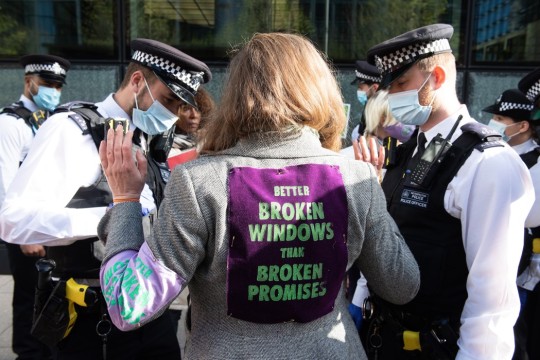
What would you say to critics of Extinction Rebellion, who are maybe more sceptical and don’t believe that radical action can result in progress? Or maybe don’t believe that there’s a climate issue at all?
Clare Farrell: I would hope that our trial has shown where ordinary people’s heads are at. It proves that the reality we live in – in terms of what’s being done at a corporate level, and what’s being done at a government level, and the rhetoric of Rishi Sunak – I hope that this is just proof that all of that is completely out of step with the general public. The general public don’t want their kids to die. They don’t want to live in a world that collapses. More and more people realise that that is precisely what is gonna happen. And they don’t want it!
I think there’s something to be said for these kinds of actions which can be an awakening for people. People are always complaining about tactics, saying people don’t like being disrupted or they don’t like what you’re doing because it’s annoying – but if you can see that someone’s in mortal danger, it’s very normal to want to tell them. I think it’s also proof that when people spend the time having an in-depth conversation about what’s taking place, there’s no question in people’s minds about what is the right thing to do. I hope so, anyway.
I hope so too. Those are actually all the questions that I had, but is there anything else that you’d like to add?
Clare Farrell: One thing which is on my mind a lot at the moment has to do with faith. I’m not a religious person, but my reflections since the trial have been quite a lot about how faith exists for me and also how it seems to be very lacking in our wider society in Britain. We live in a materialist, cynical context, which is enormously problematic because I’ve spoken to a lot of people over the last six years who’ve said to me, ‘it’s nice for you to try, but realistically, you’re never going to win – it’s too big, it’s too difficult, the power is too entrenched’. I feel like one of the key requirements for us is to find a sense of faith and in that understanding ourselves to be part of a greater whole, and not just discreet little beings that are separate from one another.
I feel really extremely lucky to have had an experience like this where we were able to win a trial and go home and think, ‘oh, right, what do I do now?’, because I thought I was gonna be in prison for Christmas. What do we do with our freedom?
The HSBC 9 are crowdfunding to cover their remaining legal costs and raise money for other activist groups’ legal costs. You can donate here. You can also read an open letter written in support of the HSBC 9 here.
39 notes
·
View notes
Photo

On this day, 24 June 1855, crowds gathered in Hyde Park, London against the Sunday Trading Bill introduced to close shops, public transport and pubs on the Sabbath. The rich were unaffected by this proposed bill but for the poor Sunday was the only day off. Printed bills from "A ratepayer of Walworth" declared: "New Sunday Bill prohibiting newspapers, shaving, smoking, eating and drinking and all kinds of recreation and nourishment, both corporal and spiritual, which the poor people still enjoy at the present time. An open-air meeting of artisans, workers and 'the lower orders' generally of the capital will take place in Hyde Park on Sunday afternoon to see how religiously the aristocracy is observing the Sabbath and how anxious it is not to employ its servants and horses on that day". Karl Marx was there, and reported that at least 200,000 people attended. According to Marx, a Chartist named Finlen addressed the crowd, and referenced the ongoing Crimean War, complaining that "Six days a week we are treated like slaves and now Parliament wants to rob us of the bit of freedom we still have on the seventh. These oligarchs and capitalists allied with sanctimonious parsons wish to do penance by mortifying us instead of themselves for the unconscionable murder in the Crimea of the sons of the people." Marx also described the sound of the protest as like an improvised concert: "what a devil's concert it was: a cacophony of grunting, hissing, whistling, squeaking, snarling, growling, croaking, shrieking, groaning, rattling, howling, gnashing sounds! A music that could drive one mad and move a stone. To this must be added outbursts of genuine old-English humour peculiarly mixed with long-contained seething wrath." The crowds grew over the next two Sundays and culminated in a riot on 1 July. More information, sources and map: https://stories.workingclasshistory.com/article/9665/Protest-against-Sunday-trading-ban https://www.facebook.com/photo.php?fbid=649606177212601&set=a.602588028581083&type=3
113 notes
·
View notes
Text
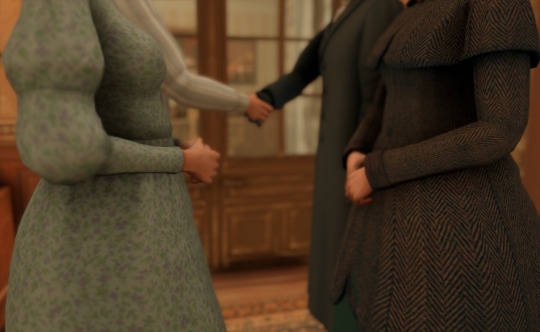
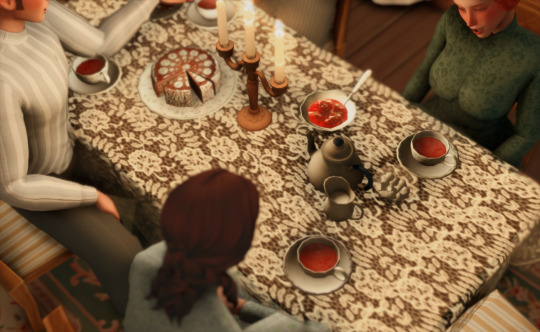

The days passed swiftly, each one blending seamlessly into the next as winter surged forward with unyielding determination. Finally, the anticipated day arrived when Edwin and Wilhelmina convened with Mary Elizabeth and her betrothed.
As Thomas ventured outdoors with Josephine, their laughter echoing through the crisp winter air, Wilhelmina gracefully ushered the children inside upon Mary Elizabeth's arrival with Edmund. A warm exchange of pleasantries ensued, with Edwin warmly extending his hand in greeting, though Edmund's demeanor remained somewhat reserved.
Seated around the table, Wilhelmina meticulously poured steaming cups of tea, the fragrant aroma filling the air, accompanied by a freshly baked cake she had lovingly prepared earlier, along with homemade jam. Edmund expressed heartfelt gratitude for their hospitality, acknowledging the arduous journey and the unwavering support they had provided to Mary Elizabeth.
Engaged in lively conversation, the four of them delved into the intricacies of how Mary Elizabeth and Edmund had crossed paths, each anecdote revealing a new layer of their shared history. It transpired that Edmund hailed from a nearby village, relocating to Birmingham over a decade ago before securing a marginally better-paying position in London less than a year prior. It was in the bustling capital where their paths serendipitously converged, marking the inception of Edmund's courtship of Mary Elizabeth.
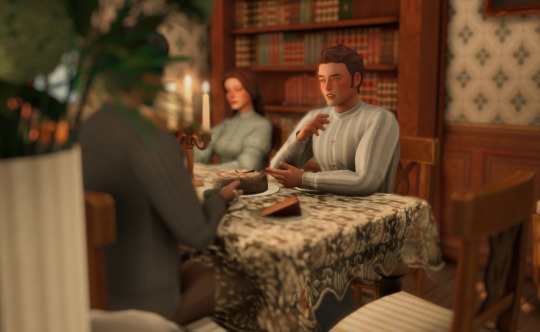
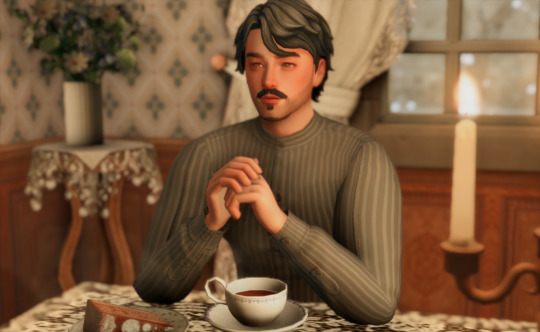

As the afternoon gradually progressed, the conversation revolved around London and its situation. Although they knew many people moved to the city to work in factories, they hadn't personally known anyone until now. For the past year, they had been reading in the newspaper about worker protests demanding better labor conditions. And most of the time, the newspapers branded the protesters as violent and greedy.
"Well, the newspapers don't always tell the truth. In the city, the hours are inhumane, and most of us don't have safety measures." commented Edmund, setting his tea cup on the saucer. Wilhelmina and Mary Elizabeth exchanged glances as Edmund spoke. "And well… there are many children, most very young, working in factories and construction. It's not the same as them working here, in the village." he continued.
Edwin nodded. "Perhaps you'd be better off here, wouldn't you? You still have your house." he said, looking at Mary Elizabeth. "You could try to find work around here, maybe in the railway." he suggested to Edmund, but he shook his head. "I have a good position in London, and I might be promoted to plant manager. And if that happens, we could afford to give Josephine and any future children a better life."
During those years, there were many riots and protests, especially in the big cities, where the Chartist Movement demanded, among other things, labor improvements. Although despite the poor working conditions, many people preferred to go to the city than live in the villages, praying for good harvests and hoping to earn a few pennies.
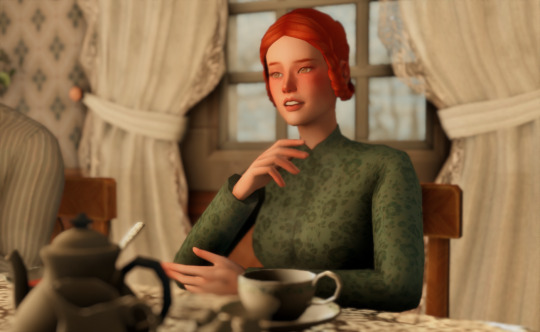
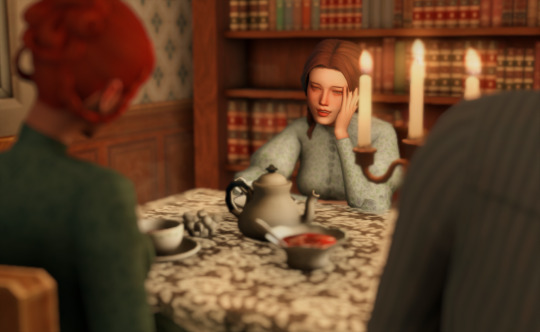

"Ah, don't worry, I'm sure we'll do just fine in the city." reassured Mary Elizabeth in her usual calm and soothing voice. "By the way, they haven't gone too far, have they?" she inquired, her gaze wandering towards the window, where Thomas and Josephine had disappeared into the snowy landscape, their laughter faintly echoing in the distance.
"Don't fret, dear, I made sure to tell Thomas not to stray too far." Wilhelmina responded, her tone filled with reassurance as she glanced out the window. "It's a bit melancholic, isn't it? The thought of them not seeing each other anymore. They've grown so close... It's hard to believe how hesitant they were with each other at the start."
Mary Elizabeth's lips curled into a fond smile. "You know, Josephine confided in me not too long ago. She expressed a desire to marry him." she revealed, a soft chuckle escaping her lips. Wilhelmina nodded knowingly at Mary Elizabeth's words, as she had already noticed how Josephine looked at Thomas.
"Oh, my Thomas is so clueless about these things..." Wilhelmina remarked with a gentle sigh, resting her chin on her hand as she leaned in closer. "But can you imagine if they do end up tying the knot someday?" A shared moment of laughter ensued between the two women, drawing the attention of Edwin and Edmund, who had been engrossed in their own conversation.
#ts4#sims 4#ts4 legacy#sims 4 legacy#ts4 decades challenge#sims 4 decades challenge#ts4 historical#1830s#the langley legacy#wilhelmina langley#edwin langley#mary elizabeth aldridge
18 notes
·
View notes
Text
It’s Frederick Marryat’s birthday very soon (10 July 1792), and I’ve been thinking a lot about the effect he’s had on my life: and just what is the nature of my fascination with this man. I think a huge part of being interested in Marryat is being drawn to the man himself, not just his stories and travel writing. You have to have some kind of personal investment in this bitchy, lecherous, sarcastic, self-righteous, frequently infuriating and problematic man; you have to care about him on some level. He feels extremely present in his writing.
I think Virginia Woolf expressed it well when she wrote in her essay on Marryat, “The Captain’s Death Bed”:
Often in a shallow book, when we wake, we wake to nothing at all; but here when we wake, we wake to the presence of a personage—a retired naval officer with an active mind and a caustic tongue, who as he trundles his wife and family across the Continent in the year 1835 is forced to give expression to his opinions in a diary.
Sometimes I wonder about what Marryat would think of me as his reader. In response to criticism in Fraser’s Magazine, Marryat wrote a long letter defending his work in cheap weekly newspapers which would be read by the lower classes (reproduced in The Life and Letters of Captain Frederick Marryat, edited by his daughter Florence Marryat). He starts out strong, attacking elitist attitudes about literature, and then shows his ass with smug pronouncements about how he’s writing wholesome fare to educate the lower classes, unlike trashy weeklies filled with “immorality and crime” that also teach people to criticize the government or read Chartists! (Marryat was a complex person whose views can’t be pinned down with modern political labels, but he wasn’t very progressive, not even in his own time.)
Marryat was my introduction to the Napoleonic Wars and the War of 1812, which have become major interests, he was my first real exposure to Regency-period fashion and manners, and he has increased my general nautical knowledge a hundredfold. I feel a kinship with him across time and space as he offers his opinions on the world of the 1830s and 40s, a bit jaded in middle age but still keenly observant and very confident in his opinions.
#frederick marryat#captain marryat#shaun talks#he's one of those 'i wish i could study him in a jar' types (and i'd shake the jar too)#but i feel bad for him#this man was at war for a billion years starting from childhood#and it definitely messed him up#and he can be a genuinely good storyteller#complicated feelings for a complicated man#i will admit to liking marryat
33 notes
·
View notes